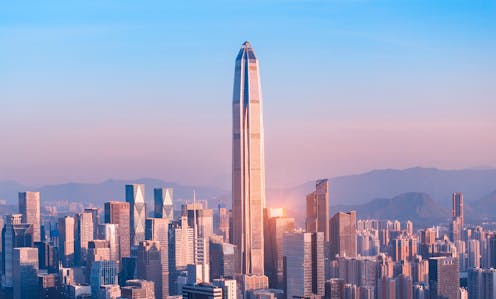Is life getting better for China’s tech billionaires?
- Written by Wenting He, PhD candidate of International Relations, Australian National University

According to the latest Bloomberg Billionaires Index, Pony Ma, co-founder of Tencent Holdings, is once again China’s richest person, now with a net worth of more than A$65 billion, placing him 27th globally.
Close behind him in the rankings are bottled water tycoon Zhong Shanshan, and Zhang Yiming, the main co-founder of tech giant ByteDance, which owns TikTok.
Only a few years ago, China’s ruling Communist Party launched a crackdown on billionaires and other business leaders. Some were publicly jailed. Others simply disappeared from public view.
Ma’s resurgence might seem like a positive signal of a more permissive market environment. But as we watch China’s private sector grow, we should remember it follows China’s unique playbook.
The ascent of Tencent
Ma’s wealth primarily comes from his stake in Tencent, which he co-founded in 1998 with its headquarters in Shenzhen. As China’s economy grew, Tencent became a world-leading internet and technology company.
Tencent is well-known for QQ and WeChat, which quickly became two of the most popular instant messaging apps in China and connect more than a billion people.
Tencent is also the largest video game vendor in China, with popular games such as “Honour of Kings” and “League of Legends”.
Last month, Tencent released “Black Myth: Wukong”, China’s first-ever “AAA” video game. AAA is a globally recognised gaming industry buzzword that refers to major, high-budget, standalone productions.
The much-hyped game surpassed 10 million sales across platforms within three days of its release, becoming one of China’s most successful games of all time.
The game itself draws on a 16th century Chinese novel called “Journey to the West” and features various Chinese landscapes. Its popularity aligns with Beijing’s ongoing efforts to boost China’s international cultural appeal.
China’s state-owned media outlet Xinhua highly praised the game for “telling Chinese stories with world-class quality” and offering a new way for global players to understand Chinese culture.
Ma’s fortunes reflect his company’s
This official appraisal means a lot. In previous years, Tencent has had a challenging time coping with Beijing’s strict gaming regulations.
In August 2021, China’s video game regulator announced policies to limit online gamers under the age of 18 to only one hour of play on Fridays, weekends and holidays. This was a major blow to China’s gaming industry, including Tencent.
In December 2023, Beijing introduced more legislation aimed at further capping the amount of money and time that could be spent on video games. The announcement resulted in a 12.4% drop in Tencent’s share price. But the company still promised to strictly implement any new regulatory requirements.
A cautionary tale
In China, complying with state regulations is important. Another Chinese tech billionaire, Jack Ma, faced the consequences of publicly challenging them.
In 2020, Jack Ma was poised to launch what was set to be the world’s largest initial public offering (IPO), raising about A$50 billion for his financial technology giant, Ant Group.
However, after he gave a speech in Shanghai harshly criticising Chinese financial regulators for outdated rules and excessive intervention, regulators halted the Ant Group IPO.
Citing concerns that Ant Group’s e-finance products encouraged unrestrained borrowing and investment, China ultimately suspended the IPO in late 2020.
Over the following years, Ant and its affiliate company Alibaba were slapped with billions in fines for alleged breaches of financial regulations.
Getting on the front foot
This phase marked a much stricter regulatory posture from China. The tech tycoons had to adapt to a new reality.
In 2021, Pony Ma publicly stressed the importance of tightly regulating internet businesses, including his own. He also proactively volunteered to meet with antitrust authorities.
Tencent downsized by divesting stakes in various sectors, and the government demanded a restructuring of its financial business.
The party remains the ultimate authority
China’s economy is a “socialist market economy”. That is, China’s government thinks of the market as a useful tool to achieve socialist objectives.
That doesn’t mean the private sector doesn’t play a huge role, but the government has long been cautious about the emerging market power of oligarchs as a potential threat to the party’s authorities.
Over past decades of reform and opening up, Beijing has been committed to unleashing market forces, encouraging private sector development and modernising its financial institutions. The precondition is that the state should maintain the ultimate authority to regulate and mobilise market resources.
However, its economy has been stubbornly sluggish post-COVID. The clampdown on the private sector has undermined the confidence of many investors and entrepreneurs, which is crucial for restoring China’s economic vitality.
Last year, Beijing introduced a 31-point action plan in response, aiming to make the private economy “bigger, better and stronger”. Hours after its release, Pony Ma publicly praised the government’s move as “encouraging and inspiring”.
Could spring now be coming for China’s private sector? Perhaps, but only on China’s terms.
Remember, market development is always a means for the state to achieve its own ends. This will never be a story of the market growing while the state steps back.
Authors: Wenting He, PhD candidate of International Relations, Australian National University
Read more https://theconversation.com/is-life-getting-better-for-chinas-tech-billionaires-239382





